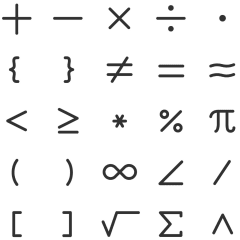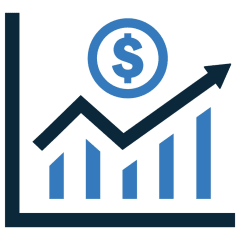10 Careers for Applied Math Graduates
If you're graduating with an applied mathematics degree, you're in luck. Analytical thinkers who can work with numbers are in high demand, thanks to the rising importance of big data and advanced computing. Jobs in mathematics and statistics are expected to grow by more than 30% between 2016 and 2026—much faster than other professions. They are also expected to be well-paid, with median salaries ranging above $100,000.
The sunny job outlook for applied mathematics majors shouldn't come as a surprise. This challenging degree is highly interdisciplinary, providing students with skills and knowledge that are valued in many industries. Applied math majors graduate with excellent abilities in research and analysis, problem solving, scientific computing, and more. They understand complex topics like statistical physics, fluid dynamics, and solid-state physics. But most importantly, they know how to think critically, analytically, and logically.
Together, these qualities prepare them for a range of careers. Let's take a look at a few of the most common ones.
This article will be covering the following careers:
| Career | Avg Salary | Satisfaction | Your Match |
|---|---|---|---|
| Mathematician | $85k | 3.6/5 | |
| Data Scientist | $132k | 3.3/5 | |
| Financial Advisor | $57k | 2.7/5 | |
| Statistician | $113k | 3.2/5 | |
| Actuary | $129k | 2.7/5 | |
| Teacher | $40k | 3.1/5 | |
| Market Research Analyst | $54k | 3.0/5 | |
| Systems Engineer | $106k | 3.4/5 | |
| Financial Quantitative Analyst | $109k | 3.2/5 | |
| Meteorologist | $69k | 3.4/5 |
Are these careers suited to you? Our comprehensive career test measures your personality traits and interests and matches you to over 800 careers.
1. Mathematician
For pure math lovers, a career as a mathematician can be the ideal pursuit. Mathematicians are found in a broad range of workplaces, from government to corporate settings. They use mathematical techniques to analyze data of all kinds, collaborating with chemists, engineers, and industrial designers to solve real-world problems.

Mathematician
A mathematician specializes in the study and exploration of mathematics.
2. Data Scientist
Computer-savvy applied mathematics majors can thrive in data science positions. Many find entry level jobs as junior data scientists or data analysts, helping companies identify insights and trends in large, complex data sets. With positions available in sales and marketing, healthcare, and academic research, there is no shortage of jobs to choose from.

Data Scientist
A data scientist uses data to solve problems and make better decisions.
3. Financial Advisor
Finance is another career direction applied math majors can consider. As financial planners, they can use their mathematical knowledge to help clients invest and manage their money more strategically. Financial planners guide parents as they establish college funds for their children, advise business owners in how to plan for the future, help aging clients prepare for retirement, and more.

Financial Advisor
A financial advisor provides financial guidance and advice to clients.
4. Statistician
Statisticians are found in all kinds of industries, from sport and finance to government and healthcare. They help employers collect, analyze, interpret, and present quantitative data and statistics of all kinds. This can involve administering surveys, conducting experiments, executing contextual analyses, drawing and presenting conclusions, and more.

Statistician
A statistician specializes in the collection, analysis, interpretation, and presentation of data.
5. Actuary
Actuaries are masters of risk and gain. They combine advanced skills in mathematical analysis with deep business knowledge to assess and advise clients on their financial risk. They help clients make sound investments and fulfill their larger commercial goals, playing an essential role in the success of many businesses.

Actuary
An actuary specializes in assessing and managing financial risks in various industries, with a primary focus on insurance and pension plans.
6. Teacher
This may be a less lucrative career option, but it can be a very rewarding one! Many applied math majors choose to use their knowledge and training to help others fall in love with the subject. They can excel as high school math teachers or tutors, guiding students through the basics of algebra, fractions, and calculus. Although most countries require high school educators to have a formal teaching qualification, it's often possible to obtain one in a year or two.

Teacher
A teacher serves as a guide, mentor, and facilitator in the learning journey of students.
7. Market Research Analyst
Market research analysts are critical thinkers with a deep knowledge of the business world. They use data analysis and statistical techniques to help companies decide what products to sell, how to promote them, and what to charge for them. This popular field is expected to grow faster than other professions, offering lots of opportunities for career advancement.

Market Research Analyst
A market research analyst specializes in studying market conditions to identify potential sales opportunities for a product or service.
8. Systems Engineer
Although many computer systems engineer positions require a degree in computer science, companies also often hire mathematics majors—especially those with relevant experience. In this role, applied mathematics majors can use their data analysis and problem-solving skills to develop and test software, circuits, and other computer systems.

Systems Engineer
A systems engineer specializes in the design, integration, and optimization of complex systems or processes.
9. Financial Quantitative Analyst
Quantitative analysts or "quants" play a key role in the financial sector. They use mathematical models and statistical techniques to resolve financial problems and manage risk. This role typically combines a range of mathematical techniques, including linear algebra, calculus, probability, and more. Financial knowledge and computer programming skills in Java, Python, C, or C++ are also highly valued.

Financial Quantitative Analyst
A financial quantitative analyst, also known as a "quant," uses mathematical and statistical methods to analyze financial data and solve complex financial problems.
10. Meteorologist
For something a little different, consider a career in meteorology. Meteorologists are specialized scientists who study and predict the weather. They apply mathematical techniques to analyze data collected from remote sensors, satellite images, radar, and weather stations. Using their strong analytical skills, they identify weather patterns, interpret causes, and create forecasts.

Meteorologist
A meteorologist specializes in studying and predicting weather patterns and atmospheric conditions.